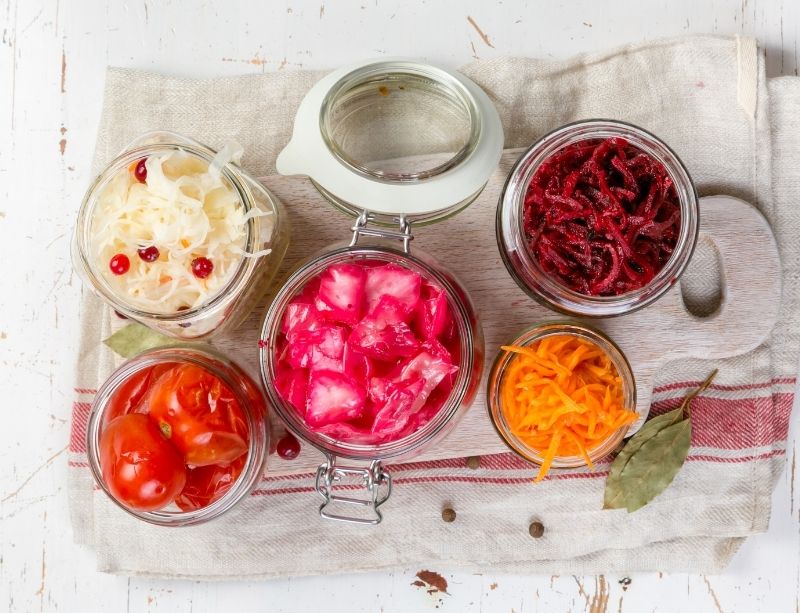“What are the health benefits of fermented foods?” is a question that comes up a lot!
To get to the bottom of this question, we interviewed a pharmacist who is very knowledgeable about fermentations, and who promotes their consumption for their health benefits.
Pharmacist Jean-Yves Dionne is also an author, broadcaster, and expert in natural health products and alternative medicines.
We have summarized here the interview that was broadcasted live (in French) on our Facebook and YouTube pages. For each question, you will find a link to the corresponding section of the video.
What Are the Main Health Benefits of Fermentation?
It should be noted that as numerous as they are, all fermentations interact differently with the human body and do not provide the same benefits.
The potential benefits vary depending on the type of fermentation and the ingredients used.
However, science shows that fermentations improve the digestion of food and the absorption of nutrients.
For example, the sourdough used to produce sourdough bread can deactivate anti-nutrients such as antitrypsin, phytic acid, or oxalates.
“The microorganisms in sourdough will ferment the ingredients, making a much more digestible bread than a yeast bread that contains gluten, which is extremely aggressive because it has not been digested.
This secretion of enzymes by microorganisms applies to many traditional fermented recipes,” observes Jean-Yves Dionne.
Listen to Jean-Yves Dionne’s answer (6:41)
What Is the Difference Between Prebiotics, Probiotics, and Enzymes?
Prebiotics
Prebiotics are soluble fibres that become the favourite food of bacteria that are found in food or in the digestive tract.
“Prebiotics are the food parts that can be fermented and that will feed good bacteria,” says the pharmacist.
Probiotics
The term “biotic” means living. Probiotics are therefore ingestible microorganisms that provide benefits to the human body.
For example, the Lactobacillus acidophilus bacteria found in fermented dairy products such as yogurt and kefir provide health benefits.
Enzymes
In fermentations, “bacteria will produce enzymes. This is how they predigest food and therefore make it more digestible,” explains Dionne.
Listen to Jean-Yves Dionne’s answer (16:10)

Are Vitamins Multiplied During Fermentation?
Some bacteria indeed create vitamins, but it is difficult to quantify them. The pharmacist admits that “it is unclear whether they create enough to make up for deficiencies”.
We know, for example, that vitamin K2 is created during fermentation, whether in animals (meat and cheese) or plants, as with natto, a Japanese fermentation based on soy.
Listen to Jean-Yves Dionne’s answer (22:15)
Are Fermented Foods High in Carbohydrates?
During fermentation, the carbohydrates in the vegetable are used for the growth of bacteria, but it is difficult to determine just how much.
“Fermented food contains less assimilable carbohydrates, the fermentation will transform the carbohydrates into lactic acid or other forms of acids.
If I ferment my food enough in terms of hours, or even days, 10%, 20% and 30% of the carbohydrates become acids.
So people on a ketogenic or low-carb diet could probably eat fermented vegetables rich in carbohydrates, such as root vegetables if they are fermented for several weeks.
Listen to Jean-Yves Dionne’s response (25:44)
Is There a Lot of Sugar in Fermented Beverages?
In practical terms, the amount of sugar in fermented beverages is much lower than in fruit juices.
“In a drink like kombucha, the sugar has virtually disappeared through fermentation. What tastes a little sour is acetic acid (vinegar) and a little alcohol,” the specialist begins.
According to him, the dosage (of sugar) would be the answer to continue drinking this beverage and maintain the benefits without exceeding your daily carbohydrate intake.
Listen to Jean-Yves Dionne’s answer (28:53).
Psst, check out our article on how to make a less sweet kombucha!
Will Fermenting Milk Make It More Digestible?
Dairy products contain lactose, a complex carbohydrate to digest. When dairy products are fermented, the amount of lactose is considerably reduced.
For example, in cheeses with eyes (holes), such as Emmental and Gruyere, the amount of lactose is minimal.
Listen to Jean-Yves Dionne’s answer (32:00)
Are There Any Contraindications To Eating Fermented Foods?
“Can you eat too much of it? I don’t think so!” he says. “In any case, I don’t know of any contraindications.”
Lacto-fermentations can however cause bloating for people with intolerances.
Tolerances or intolerances are unique to each individual. Trust your body’s. If you don’t feel well, stop consuming it, advises the pharmacist.
Listen to Jean-Yves Dionne’s answer (33:57)
Are Moulds Dangerous?
If there is a strange smell coming from the jar or if there is mould all over it, the best thing to do is to throw it away.
“There are some extremely dangerous moulds. When it’s black, I throw it away. Black mould, known as Aspergillus niger, is the one that colonizes our homes. It’s extremely dangerous, it generates toxic molecules,” he says.
However, if you have a cabbage leaf with a bit of mould in your sauerkraut, just remove it. There is no danger to health, the pharmacist tells us.
Listen to Jean-Yves Dionne’s answer (38:36)
Is Salt in Lacto-Fermentations Harmful to Health?
Salt is essential for successful vegetable fermentation, as it enables the selection of good bacteria.
“Salt has a preserving role and from a health point of view, it is not harmful. Most people can benefit from more salt,” he says. Except for people with high blood pressure, who are often already on medication.
For those who don’t have hypertension or who are hypotensive, please don’t cut back on salt anymore. [The scientific community points out that] the majority of people can benefit from more salt,” he says.
To achieve lacto-fermentation, ideally, 2% salt should be added to the total weight of the vegetables. With this amount, there won’t be too much salt.
Listen to Jean-Yves Dionne’s answer (41:01)
Are Fermentations Compatible With Antidepressants?
“To my knowledge, I have never read that there is an interaction between antidepressants or similar drugs and lacto-fermentation,” he says spontaneously.
Listen to Jean-Yves Dionne’s answer (49:20)

